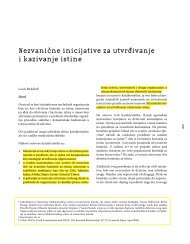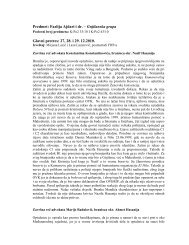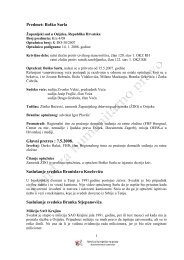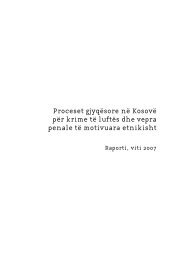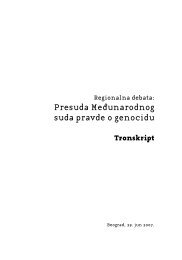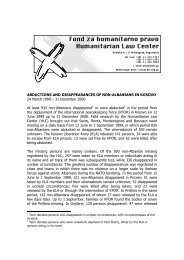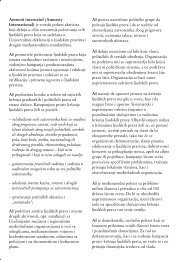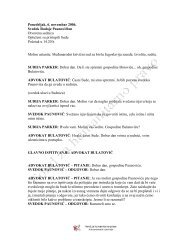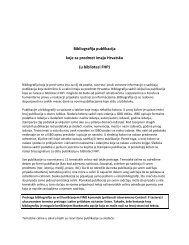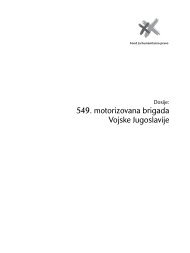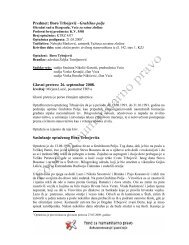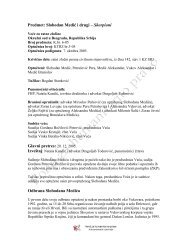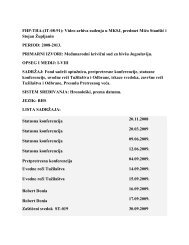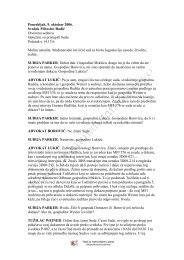here - Humanitarian Law Center/Fond za humanitarno pravo
here - Humanitarian Law Center/Fond za humanitarno pravo
here - Humanitarian Law Center/Fond za humanitarno pravo
Create successful ePaper yourself
Turn your PDF publications into a flip-book with our unique Google optimized e-Paper software.
adequate education or relevant previous experience working with people who have experienced<br />
serious traumas. As a result, victims who are expected to testify do not receive adequate<br />
assistance and are often exposed to secondary victimisation, affecting the quality of the<br />
proceedings and the facts to be established on the basis of their testimonies. The Skočić case best<br />
illustrates the effects of the poor performance of this service in 2012.<br />
The International Criminal Tribunal for the former Yugoslavia and International Criminal<br />
Tribunal for Rwanda established important victim and witness protection mechanisms but neither<br />
the same nor similar practices have been used in war crimes trials in Serbia. Elsew<strong>here</strong> in the<br />
region, the Croatian Ministry of Justice has established a Division for Probation and Victim and<br />
Witness Support whose units and departments offer adequate support to victims and witnesses<br />
and the effects of this are visible during the examination of witnesses in Croatia.<br />
5. Court of Appeal (War Crimes Chamber) in Belgrade an example of promptness<br />
and efficiency<br />
In 2012 the War Crimes Chamber of the Court of Appeal in Belgrade delivered five judgements<br />
following appeals of first-instance rulings of the High Court in Belgrade and onethe ruling of<br />
Court of Appeal in Belgrade. As in 2011 20 the Court of Appeal again acted promptly and reached<br />
decisions on appeals in all the cases in which first-instance and second-instance rulings had been<br />
delivered in 2011.<br />
6. Sentencing policy<br />
Sentencing policy in proceedings for war crimes in Serbia, except in cases conducted by the<br />
courts of general jurisdiction, is established by the Court of Appeal in Belgrade and its judgments<br />
are final. In 2012 this court handed down four decisions on merits, w<strong>here</strong>by these cases were<br />
conclusively adjudicated. Sentencing by courts hearing war crimes cases is generally poor. The<br />
courts, almost as a rule, tend to give far too much weight to mitigating circumstances and not<br />
enough to aggravating circumstances. Also, the courts frequently make use of the option of<br />
penalty reduction, which although available to them under the legislation, is not an obligation,<br />
and doing so runs contrary to lawmakers’ intentions, which was to use this option only in<br />
exceptional circumstances. It is quite inappropriate t<strong>here</strong>fore to consider the aggregate weight of<br />
mitigating circumstances found as the equivalent of one particularly mitigating circumstance.<br />
Additionally, at least two such particular circumstances must be identified, with each of them<br />
being special and not being an essential element of the crime charged. Hence, it can be concluded<br />
20<br />
Report on War Crimes Trials in Serbia in 2011, HLC, p. 9.<br />
10




